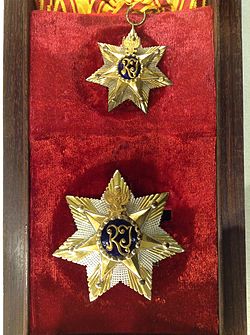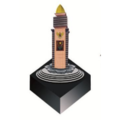| Name | Ribbon | Class | Notes |
|---|
Bintang Garuda
Garuda Star |  | | Awarded to the Air Force personnel served in the independence war between 1945 and 1949. [55] No longer awarded and extinct since 2009. [2] |
Bintang Sewindu Angkatan Perang
Armed Forces Eight Years’ Service Star |  | | Awarded in 1953 to mark the 8th year or windu year since the foundation of the Indonesian National Armed Forces. Bintang Sewindu Angkatan Perang is awarded to all active military personnel who continuously serve from 5 October 1945 to 5 October 1953. [56] No longer awarded and extinct since 2009. [2] |
Satyalancana Peristiwa Aksi Militer I
Campaign/Battlefield Commemoration Medals I (Dutch Military Aggression I) |  | | Dormant award. Awarded to personnel of the Armed Forces and Police for gallant participation in military operations as may be ordered by the government through the National Armed Forces/National Police General Headquarters. [57] |
Satyalancana Peristiwa Aksi Militer II
Campaign/Battlefield Commemoration Medals II (Dutch Military Aggression II) |  | |
Satyalancana Gerakan Operasi Militer I (Madiun Affair)
Military Operations Service Medals I |  | | Dormant award. This one of few awards which may bestowed upon all personnel of the armed forces and the National Police Mobile Brigade regardless of rank held upon the issuance of the medal. Awarded on behalf of the Republic for successful conduct and service rendered during military operations as may be ordered by the Government of the Republic, together with the National Armed Forces and the Police. |
| Satyalancana Gerakan Operasi Militer II (APRA coup d'état) |  | |
| Satyalancana Gerakan Operasi Militer III (Invasion of Ambon) |  | |
| Satyalancana Gerakan Operasi Militer IV (Darul Islam rebellion South Sulawesi chapter) |  | |
| Satyalancana Gerakan Operasi Militer V (Darul Islam rebellion West Java chapter) |  | |
| Satyalancana Gerakan Operasi Militer VI (Angkatan Umat Islam rebellion) |  | |
| Satyalancana Gerakan Operasi Militer VII (Darul Islam rebellion Aceh chapter) |  | |
| Satyalancana Gerakan Operasi Militer VIII (Communist insurgency in Sarawak) |  | | Also known as Satyalancana Dharma Phala. [58] |
| Satyalancana Gerakan Operasi Militer IX (Operation Trikora) |  | | Also known as Satyalancana Raksaka Dharma. [59] |
Satyalancana Penegak
Medal for Combat Against Communists |  | | No longer awarded since massive extermination program for communist insurgency in 1965-1966 and the fall of Sukarno's old order regime in 1967. Awarded to National Armed Forces and National Police personnel, regardless of rank, for active service in actions against the Communist Party of Indonesia, paramilitaries, and CPI-linked affiliated organizations. [60] |
Satyalancana Seroja
Timor Military Campaign Medal |  | | Obsolete award and extinct following secession of East Timor from Indonesia. Awarded on behalf of the Republic for successful conduct and service rendered during the 1975 Indonesian invasion of East Timor and its subsequent Indonesian rule. This one of few awards which may bestowed upon all personnel of the armed forces and the National Police Mobile Brigade regardless of rank held upon the issuance of the medal. |
Satyalancana Wira Dharma
Malaysia/Northern Borneo Military Campaign Medal |  | | Obsolete award and extinct following the collapse of Sukarno regime who failed to prevent Malaya Federation gaining independence and normalization diplomatic relationship between Indonesia and Malaysia. Awarded to National Armed Force and National Police personnel for service in Konfrontasi . [61] This is one of only few awards that may be bestowed upon enlisted personnel of the Armed Forces. The name of this award is still being used today, albeit different purpose and award/ribbon design. [49] |
Satyalancana Saptamarga
PRRI Military Campaign Medal |  | | Extinct Award. Awarded to personnel of the Armed Forces and Police for participation in military operations against Revolutionary Government of the Republic of Indonesia. [62] |
Satyalancana Satya Dharma
West Guinea Military Campaign Medal |  | | Extinct Award. Awarded to personnel of the Armed Forces and Police for participation in West New Guinea dispute. [63] |
Satyalancana Jasadharma Angkatan Laut
Navy Establishment Medal |  | | Extinct Award. Awarded to any citizen of Indonesia and non-personnel of the Indonesian Navy for their service in the establishment of the Indonesian Navy. [64] |
| Satyalancana Yuda Tama Angkatan Laut Republik Indonesia | | I | Obsolete award. Awarded to Indonesian Navy personnel, except Marine Corps, who has given extraordinary service for the Navy, divided into 1st and 2nd Classes, respectively. [65] |
| II |
| Satyalancana Yuda Tama Korps Komando Angkatan Laut Republik Indonesia |  | I | Obsolete award. Awarded to Indonesian Marine Corps personnel, who has given extraordinary service for the Navy, divided into 1st and 2nd Classes, respectively. [66] |
 | II |














